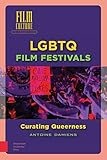LGBTQ Film Festivals : Curating Queerness / Antoine Damiens.
Material type: TextSeries: Film Culture in TransitionPublisher: Amsterdam : Amsterdam University Press, [2020]Copyright date: ©2020Description: 1 online resource (294 p.)Content type:
TextSeries: Film Culture in TransitionPublisher: Amsterdam : Amsterdam University Press, [2020]Copyright date: ©2020Description: 1 online resource (294 p.)Content type: - 9789048543892
- Cultural industries
- Gay and lesbian film festivals
- Homosexuality and motion pictures
- Sex role in motion pictures
- Sexual minorities in motion pictures
- Cultural Studies
- Fan and Audience Studies
- Festivals, Theatre, and Performance
- Film, Media, and Communication
- Gender and Sexuality Studies
- Media Studies
- SOCIAL SCIENCE / Media Studies
- Film festivals
- LGBT
- distribution
- history of film studies
- queer cinema
- 791.4365266 23
- PN1993.44 .G39 2020
- PN1993.44 .G39 2020
- online - DeGruyter
| Item type | Current library | Call number | URL | Status | Notes | Barcode | |
|---|---|---|---|---|---|---|---|
 eBook
eBook
|
Biblioteca "Angelicum" Pont. Univ. S.Tommaso d'Aquino Nuvola online | online - DeGruyter (Browse shelf(Opens below)) | Online access | Not for loan (Accesso limitato) | Accesso per gli utenti autorizzati / Access for authorized users | (dgr)9789048543892 |
Browsing Biblioteca "Angelicum" Pont. Univ. S.Tommaso d'Aquino shelves, Shelving location: Nuvola online Close shelf browser (Hides shelf browser)

|

|

|

|

|

|

|
||
| online - DeGruyter Border Communities at the Edge of the Roman Empire : Processes of Change in the Civitas Cananefatium / | online - DeGruyter The Roman Object Revolution : Objectscapes and Intra-Cultural Connectivity in Northwest Europe / | online - DeGruyter Early Cinema, Modernity and Visual Culture : The Imaginary of the Balkans / | online - DeGruyter LGBTQ Film Festivals : Curating Queerness / | online - DeGruyter Beyond the Essay Film : Subjectivity, Textuality and Technology / | online - DeGruyter Transnational Play : Piracy, Urban Art, and Mobile Games / | online - DeGruyter Kashmir as a Borderland : The Politics of Space and Belonging across the Line of Control / |
Frontmatter -- Table of Contents -- Dedication -- Acknowledgements -- List of abbreviations -- Introduction. Festivals, Uncut : Queering Film Festival Studies, Curating LGBTQ Film Festivals -- 1. Festivals that (did not) Matter : Festivals’ Archival Practices and the Field Imaginary of Festival Studies -- 2. The Queer Film Ecosystem : Symbolic Economy, Festivals, and Queer Cinema’s Legs -- 3. Out of the Celluloid Closet, into the Theatres! Towards a Genealogy of Queer Film Festivals and Gay and Lesbian Film Studies -- 4. Festivals as Archives: Collective Memory and LGBTQ Festivals’ Temporality -- 5. Images+Translation: Imagining Queerness and its Homoscapes -- Conclusion. The Impossibility of Festival Studies? On the Temporalities of Field Intervention and the Queering of Festival Studies -- Appendix -- Bibliography -- Filmography -- About the Author -- Index
restricted access online access with authorization star
http://purl.org/coar/access_right/c_16ec
While scholars have theorized major film festivals, they have ignored smaller, ephemeral, events. In taking seriously minor European and North-American LGBT festivals which often only exist as traces within archival collections, this book revisits festival studies' methodological and theoretical apparatuses. As the first 'critique' of festival studies from within, LGBTQ Film Festivals argues that both festivals and queer film cultures are by definition ephemeral.[-]The book is organized around two concepts: First, 'critical festival studies' examines the political project and disciplinary assumptions that structure festival research. Second, 'the festival as a method' pays attention to festivals' role as producers of knowledge: it argues that festivals are not mere objects of research but also actors already shaping academic, industrial, and popular cinematic knowledge. Drawing on my experience on the festival circuit, this book pays homage to the labour of queer organizers, critics, and scholars and opens up new avenues for festival research.
Mode of access: Internet via World Wide Web.
In English.
Description based on online resource; title from PDF title page (publisher's Web site, viewed 27. Jan 2023)


